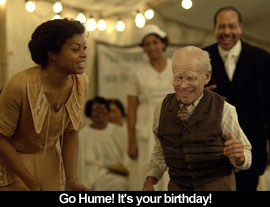*/****
starring Brad Pitt, Cate Blanchett, Taraji P. Henson, Tilda Swinton
screenplay by Eric Roth, based on the short story by F. Scott Fitzgerald
directed by David Fincher
 by Walter Chaw Based on an evergreen F. Scott Fitzgerald short story that had the decency to be a short story, David Fincher’s extravagant, OCD-extruded The Curious Case of Benjamin Button is less one of this year’s astounding ruminations on loss, regret, melancholy, and the ephemeral nature of love than it is a remake–tonally, structurally–of Forrest Gump. It highlights just how good, how complex and ambitious, Coppola’s similar Youth Without Youth is–and it clarifies, if clarification were needed, how a high-concept becomes a gimmick without a core of gravity to keep it from spinning off into butter. The picture is thick with exploitive gestures, from its comic-relief mammy all the way through to Hurricane Katrina being used as the catastrophic backdrop that lends…what, gravitas?…to the melo-tragic love story that is the end-all of its Titanic framing story. How best to unite an ossified granny with her long-lost love than the mass-drowning and general devastation of a lot of people who don’t matter one iota to our central drama? It’s not deplorable in the traditional sense, I guess, but it’s so saccharine and dumbed-down that it’s aggressively offensive anyway. Benjamin Button painfully articulates everything subtle, melancholic, and beautiful about stuff like Synecdoche, New York, A Christmas Tale, and The Wrestler in broad pronouncements for the slowest students in class. When dealing with existential matters, it’s best not to go the Celestine Prophecy/Jonathan Livingston Seagull route with platitudes and easy solutions to thorny, baseline questions about what it is to love, to age, to die. There’s a scene in the film, probably more than halfway through, where one character says to the other that things pass too quickly and, more, isn’t that a shame. A little later, those same two hold each other in front of a mirror and one says he’d like to remember how they are, right at this moment, as time plays its tricks on our affections. The Curious Case of Benjamin Button is Fincher’s own Se7en, except it shows the head in the box.
by Walter Chaw Based on an evergreen F. Scott Fitzgerald short story that had the decency to be a short story, David Fincher’s extravagant, OCD-extruded The Curious Case of Benjamin Button is less one of this year’s astounding ruminations on loss, regret, melancholy, and the ephemeral nature of love than it is a remake–tonally, structurally–of Forrest Gump. It highlights just how good, how complex and ambitious, Coppola’s similar Youth Without Youth is–and it clarifies, if clarification were needed, how a high-concept becomes a gimmick without a core of gravity to keep it from spinning off into butter. The picture is thick with exploitive gestures, from its comic-relief mammy all the way through to Hurricane Katrina being used as the catastrophic backdrop that lends…what, gravitas?…to the melo-tragic love story that is the end-all of its Titanic framing story. How best to unite an ossified granny with her long-lost love than the mass-drowning and general devastation of a lot of people who don’t matter one iota to our central drama? It’s not deplorable in the traditional sense, I guess, but it’s so saccharine and dumbed-down that it’s aggressively offensive anyway. Benjamin Button painfully articulates everything subtle, melancholic, and beautiful about stuff like Synecdoche, New York, A Christmas Tale, and The Wrestler in broad pronouncements for the slowest students in class. When dealing with existential matters, it’s best not to go the Celestine Prophecy/Jonathan Livingston Seagull route with platitudes and easy solutions to thorny, baseline questions about what it is to love, to age, to die. There’s a scene in the film, probably more than halfway through, where one character says to the other that things pass too quickly and, more, isn’t that a shame. A little later, those same two hold each other in front of a mirror and one says he’d like to remember how they are, right at this moment, as time plays its tricks on our affections. The Curious Case of Benjamin Button is Fincher’s own Se7en, except it shows the head in the box.
by Ian Pugh SPOILER WARNING IN EFFECT. Never mind all of this "true story" malarkey–what really makes The Haunting in Connecticut stand out from the pack is the sociopathic obnoxiousness with which it's been marketed to moviegoers. The dark and depressing trailers are bad enough, but who can forget the giant ad that invaded YouTube's front page last week that showed a young boy ejecting a gravity-defying stream of vomit before inviting the user to "click to watch two dead boys"? Though "dead boys" is actually a reference to the famous folk poem (as in "back to back they faced each other"), it's still not exactly the smartest way to promote your wares outside the hopefully-miniscule sadist demographic–especially when the final product ends up being cookie-cutter ADD bullshit like The Haunting in Connecticut.

 by Walter Chaw
by Walter Chaw by Walter Chaw
by Walter Chaw by Walter Chaw
by Walter Chaw by Ian Pugh
by Ian Pugh by Walter Chaw
by Walter Chaw